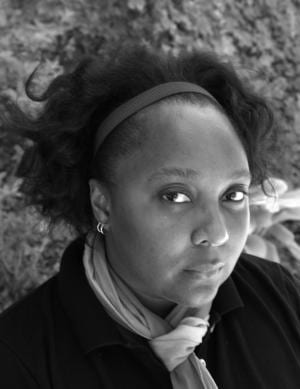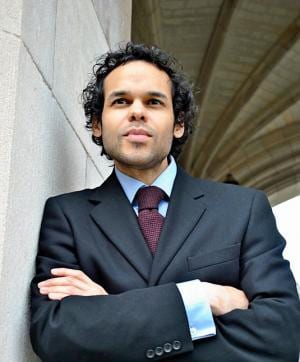2012 Provost’s Postdoctoral Fellows

Alicia E. Ellis
Faculty Mentor: David Wellbery. Department: Germanic Studies
Alicia E. Ellis is currently assistant professor of German and Comparative Literature at Hampshire College. She graduated from Amherst College (A.B. German and Women’s & Gender Studies, 1998) and taught bilingual Spanish 3rd grade for Teach for America in Los Angeles for two years before entering Yale University (2000). Alicia earned an M.A. in African American Studies with a focus on the Black Atlantic. She completed her graduate studies at Yale University in Germanic Languages & Literatures (M.A., M.Phil. & Ph.D.) with broad training in the literature and intellectual history of the long 19thcentury. She has also studied in Germany at the Universities of Göttingen, Konstanz and Heidelberg.
Alicia was a Five College Dissertation Fellow in German Literature and taught in the Department of Women’s and Gender Studies at Amherst College (2006-2008). She is also a former Junior Fellow of the Max Planck/Humboldt Research project, “Geschichte + Gedächtnis,” at Konstanz University (chaired by Aleida Assmann) where she lectured on cultural and mythic memory as historically bound constructs. She is a faculty affiliate at Yale University’s Initiative on Race Gender and Globalization (IRGG) and serves on the steering committee of the Five College Women’s Research Center at Mt. Holyoke College.
During her time as a PCEPS, Alicia will prepare and expand her doctoral thesis, “Gender, Narrative and Revision: An Analysis of Heinrich von Kleist’s Penthesilea and Franz Grillparzer’s Sappho and Medea,” for publication as a book-length monograph on the framing of difference in 19th century representations of female protagonists. She will also begin a new research project on citation and translation as theoretical practices in 20th Century writers from Mandelstam to Chamoiseau. Alicia also has a budding interest in the visual arts: she has begun a study of the ceremonial and cultural valuation of funerary art, objects that indicate both futurity and death. She has written and lectured on E.T.A. Hoffmann, Ingeborg Bachmann, Christa Wolf and Edwidge Danticat.
Alicia has recently published two articles: “Identity as Cultural Production in Andrea Levy’s Small Island” in EnterText, “Special Issue on Andrea Levy 9” and “Die Verwandlung von Bedeutung in Franz Grillparzers Medea” in Jahrbuch der Grillparzer-Gesellschaft, 3. Folge, Band 24.

Scott Washington
Faculty Mentor: John Levi Martin. Department: Sociology & Fellow in the Center for the Study of Race, Politics and Culture
Scott Leon Washington received his Ph.D. in sociology from Princeton University, where he acquired a background in demography at the Office of Population Research. He has a wide variety of interests (ranging from quantitative techniques to the philosophy of the social sciences), but his primary areas of research include: stratification, culture, law, politics, comparative history, social theory, and race and ethnicity. A former Prize Fellow at the Center for Human Values and the Woodrow Wilson School of Public and International Affairs, he is now finishing a book on the crystallization of the one-drop rule in the United States between 1880 and 1940. For his work Scott has received a number of awards, including fellowships and grants from the Harry Frank Guggenheim Foundation, the National Research Council, the Board of Trustees at Princeton University, and the American Academy of Political and Social Science.

John Wee
Faculty Mentor: Christopher Woods. Department: Near Eastern Languages and Civilizations
John Wee graduated from Yale University with an M.A. in History (2008) and a Ph.D. in Near Eastern Languages and Civilizations (2012) and was honored as a Samuel K. Bushnell fellow at Yale. A Landesstiftung Baden-Württemberg Scholarship also allowed him a year’s study in Assyriology at Heidelberg University. As a historian of science and medicine in early Iraq, Egypt, and Greece, John seeks to build bridges between ancient written documents and modern historiographies of science. His dissertation on “The Practice of Diagnosis in Mesopotamian Medicine” explores how observed bodily phenomena are expressed in the language of medical signs, as well as how textual contexts and the physicality of textual objects shape the interpretation of written observation claims. He also produced a fresh edition and translation of the cuneiform commentaries on diagnostic texts, illuminating their intellectual milieu and their place in the medical curriculum. The dissertation was unanimously judged as distinguished by his readers, awarded Yale’s William J. Horwitz prize, and will be published as a book by Brill Academic Press. In summer 2012, John was chosen as a speaker at an international conference on Greco-Roman medicine (HOMO PATIENS) at the Humboldt University of Berlin, where he addressed the topic of “The Patient as Variable: Presuppositions in the Writing of Case Histories” in relation to the Hippocratic Epidemics. John will continue to contribute to a collaborative Yale project, which aims to edit, translate, and digitalize the diverse corpus of Babylonian and Assyrian commentaries. At the University of Chicago, he will focus on editing and analyzing the cuneiform commentaries on early astronomy and astrology.
